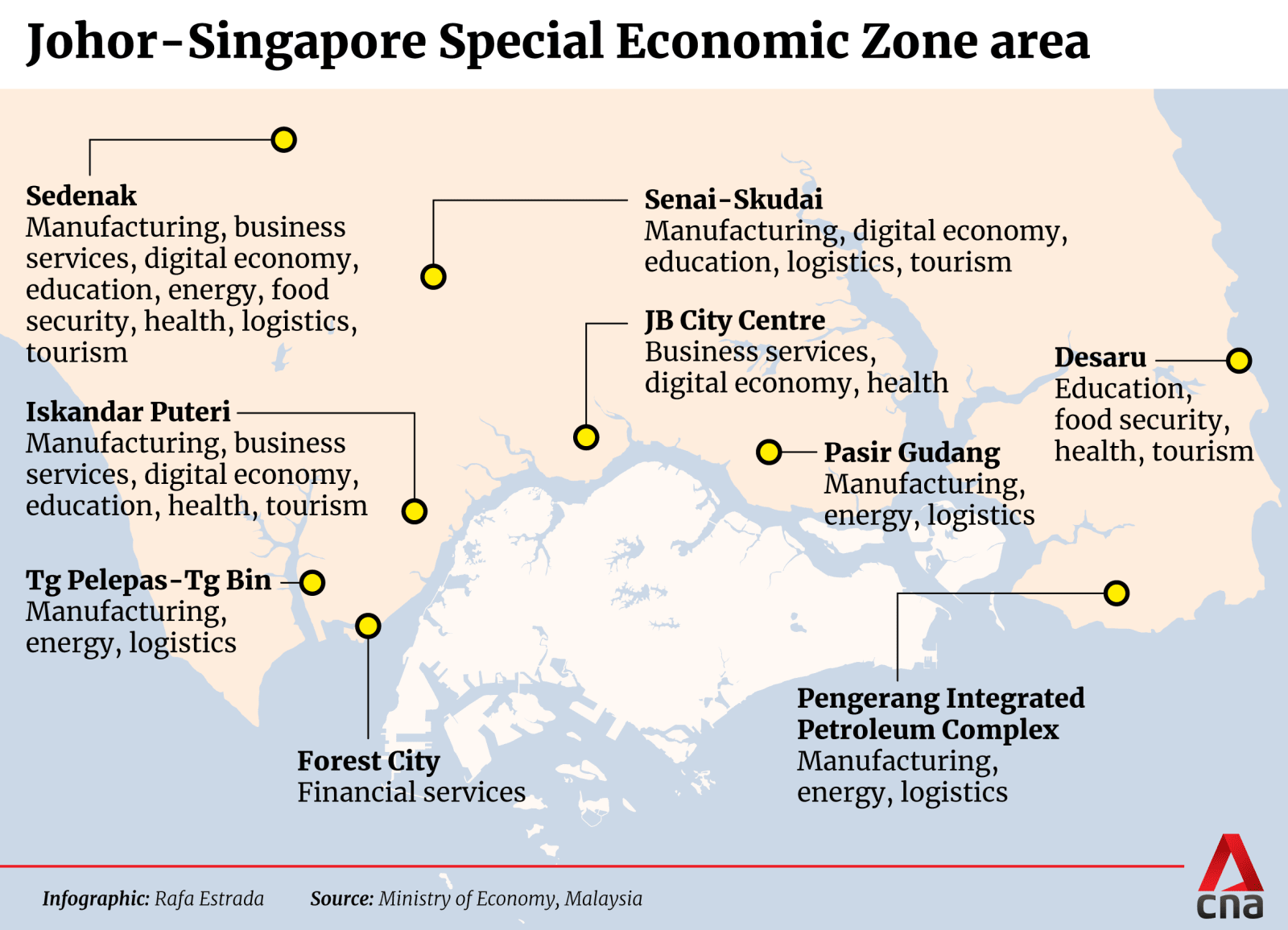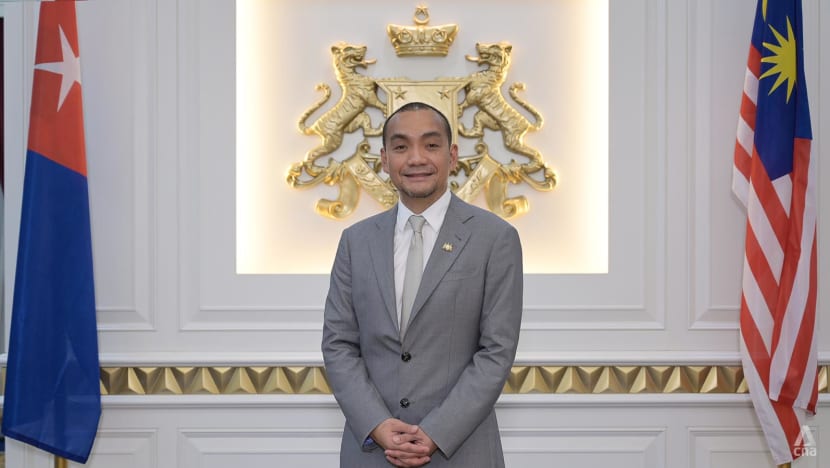Wide range of industries in Johor-Singapore SEZ offers buffer against global trade tensions, says state’s chief minister
In an interview with CNA a month after both countries inked an agreement on the Johor-Singapore Special Economic Zone (SEZ), the Malaysian southern state’s chief minister Onn Hafiz Ghazi touched on his key priorities for the SEZ’s long-term success.

Johor Chief Minister Onn Hafiz Ghazi speaks during an exclusive interview with CNA in his office in Iskandar Puteri, Johor, on Feb 7, 2025. (Photo: CNA/Zamzahuri Abas)

This audio is generated by an AI tool.
ISKANDAR PUTERI, Johor: The diverse industries earmarked for the Johor-Singapore Special Economic Zone (SEZ) and a resilient workforce will help the SEZ manage uncertainties arising from trade tensions between America and China, said Johor chief minister Onn Hafiz Ghazi.
Speaking to CNA in an exclusive interview on Friday (Feb 7), exactly a month after both Singapore and Malaysia inked an agreement on the SEZ, Onn Hafiz also stressed that Johor’s top priority now is to focus on implementing the zone’s policies as well as attracting investors so that it can complement the economic strengths of Singapore and Malaysia’s Klang Valley.
“I think if you look at the sectors, there is a clear show that we are diversifying into lots of industries, I think that should help manage the uncertainties that's happening in the world,” he said.
“And at the same time, we are putting a lot of effort when it comes to (developing) our talents. And I think by having a resilient workforce, by giving them proper training and education, we should be able to embrace (the challenges of a global trade war) quite well,” he added.
Economists have warned that United States President Donald Trump’s trade tariffs - amid heightened geopolitical tensions - could trigger permanent change around supply chains and that Malaysia could suffer a spillover effect.
On Feb 1, Trump ordered 25 per cent tariffs on Canadian and Mexican imports. He also hit China with a 10 per cent tariff in addition to levies already in place.
However, Mexico and Canada later said Trump has agreed to a 30-day pause in return for concessions on border and crime enforcement with the two neighbouring countries.
Beijing has fired back with retaliatory duties and also filed a lawsuit with the World Trade Organization.
Amid the uncertainty, analysts have said that Malaysian sectors such as the semiconductor, solar and manufacturing industries which rely heavily on cross-border supply networks may be vulnerable.
However, Onn Hafiz stressed that the diversified nature of the 11 different sectors stipulated in the JS-SEZ deal, which he said takes into account “global demand and Johor’s strength”, will ensure the zone remains resilient amid global trade tensions.
The agreement signed in January stated that the JS-SEZ will promote and facilitate investments across 11 sectors - manufacturing, logistics, food security, tourism, energy, the digital economy, the green economy, financial services, business services, education and health.
The economic zone will span 3,571 sq km and comprise nine “flagship areas” catering to different economic sectors.

One area from which Johor is keen to draw greater investment is the data centre industry.
Major data centre players both from the US and China have set up operations in southern Johor. These include the likes of Nvidia, Microsoft and GDS International, whose data centres house servers and chips powering artificial intelligence (AI).
Some analysts have suggested that the emergence of Chinese AI company DeepSeek could affect the data centre boom, given the firm’s claim that it could match top competitors in America using much cheaper technology and rely less on data centres.
However, Onn Hafiz was sanguine that Johor’s data centre industry will continue to thrive given strong persistent demand from international firms to set up bases in the SEZ.
“At the moment, the demand (to build more) data centres in Johor is huge, there are requests from US, China, Australia and quite frankly, this demand is getting higher,” he added.
“Right now it's not a major concern, but we will monitor as it goes.”

PREMIUM SALARIES, CAR QR-CODE CLEARANCE ON THE CARDS
A potential hindrance for some companies to invest in the JS-SEZ are concerns relating to sourcing skilled and technical workers in Johor and congestion at the land crossings delaying the movement of people and goods
Onn Hafiz is confident that Johor will address these worries.
On building a resilient workforce, he stressed that the state is focused on increasing salary packages for locals so that it can retain talent and stem a brain drain.
He said that data centres in Johor are set to offer starting salaries of around RM4,000 (US$900) for diploma holders and RM5,000 for degree holders.
Through the Johor Talent Development Council, the state is getting the assistance of more than two dozen universities and over 100 technical training institutions to offer modules and programmes to enhance the skills of Johoreans.
“So it's not just about premium salaries, but it must also match with the qualification and the skill sets, and that's how we're going to differentiate ourselves from other states,” said Onn Hafiz.
On improving connectivity between Singapore and Johor, the Machap state assemblyman highlighted that the RTS Link is the “medium to long term solution” to reduce congestion and improve accessibility for travellers.
The 4km Johor Bahru-Singapore RTS Link is expected to begin service by the end of 2026. It aims to ease traffic congestion on the Causeway – one of the world's busiest border crossings – by ferrying up to 10,000 passengers an hour each way on a journey that takes about five minutes.
However, in the meantime, Onn Hafiz stressed that the authorities were pressing ahead with implementing passport-free travel at the land checkpoints via the QR-code clearance app MyBorderPass.
Travellers who commute across the land checkpoints by bus or motorcycles are currently allowed to use it, but Onn Hafiz added that the next stage is to implement the app’s use for those in cars.
“That to me, will also be a game-changer because once they start implementing it for the cars, I believe that the congestion will automatically be reduced because it will reduce … human error,” said Onn Hafiz.
The chief minister also touched on the tax incentives recently announced by the Malaysia federal government to draw investments to the Johor-Singapore SEZ.
The incentives include a 5 per cent tax rate for 15 years for companies investing in high-value activities such as AI and aerospace manufacturing, and an income tax rate of 15 per cent for 10 years for eligible knowledge workers.
“The first step is to promote the JSSEZ initiatives … these are very attractive fiscal and non-fiscal incentives … now is the time to ensure we implement them,” he added.
To promote ease of doing business, the Invest Malaysia Facilitation Centre in Johor is set to be operational by the end of February.
The centre located in Forest City is a one-stop office which offers business consultation services for companies keen on investing in the SEZ.
It is the first of its kind outside the Klang Valley, added Onn Hafiz.
GIVING BACK INVESTMENT PROCEEDS TO JOHOREANS
He also pointed out that the state government was cognisant of how the SEZ could drive up the cost of living in the state, and that Johor is keen to use some of the investment proceeds to aid its people in areas like providing affordable housing and basic necessities like food.
He noted that the state government registered a record RM2.1 billion in net earnings for 2024 - this highest Johor has ever achieved - and is on the right trajectory to clinch RM2.5 billion in subsequent years.
“This is not just for us to put in our reserves. Yes, reserves are important, but more importantly, how do we give back to the people?” said Onn Hafiz.
“In the cities we have to make sure there are proper, affordable houses and we have to make sure that anyone staying in the SEZ area - it's not just about working here but they can live and also play,” he added.
In terms of Johor’s targets, Onn Hafiz outlined that the southern state has “big ambitions” and is eyeing to be Malaysia’s most developed state by 2030.
To this end, he has set “KPIs” including achieving 7 per cent growth, a gross domestic product of RM2.5 billion a year and an average household income of RM10,500 for 2030.
As of December 2022, the average monthly household income in Johor was RM8,517.
Onn Hafiz added that he and the other state representatives are aiming to fulfill 252 initiatives, which includes policies relating to the JS-SEZ.
“If we do not deliver, I fear we cannot achieve our ambitious goal. And this is not something that I personally came up with alone. It's also with the decree of the King and the Regent of Johor,” he added.


















.jpg?itok=eCp5s7-3)




